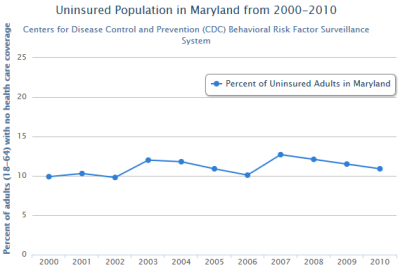
The percentage of adults ages 18 to 64 in Maryland without health insurance increased slightly between 2000 and 2010, according to a survey by the Centers for Disease Control and Prevention. (Graphic: Kirsten Petersen)
COLLEGE PARK, Md. (Sept. 19, 2013)—Several health organizations in Maryland are preparing to provide one-on-one, in-person assistance to help uninsured and underinsured residents enroll in new health care plans under the Affordable Care Act.
Beginning Oct. 1, individuals who do not have access to health insurance through their employer will be able to shop for coverage through the Maryland Health Connection, an online marketplace that matches applicants with options that fit their budget and the needs of their families.
Maryland is one of 16 states and the District of Columbia that have established their own marketplaces with competitive rates. The rest of the country will enroll in new insurance plans through the federal government’s health insurance marketplace.
The marketplace was designed to meet the demands of the Affordable Care Act, also known as Obamacare, which requires all Americans—except for those with religious or income exemptions—to have health insurance or face a penalty.
“It’s hard to tell people ‘I’m sorry, but we don’t have anything you qualify for,’” said Kathleen Westcoat, the CEO of HealthCare Access Maryland. “Now there will be an option for everybody.”
To ensure that consumers are able to make well-informed decisions on insurance purchases, the Maryland Health Benefit Exchange awarded $24 million in grants to six organizations—called connector entities—that will specialize in enrolling residents in health insurance plans.
The six organizations, which each represent a region of the state, will use the grant funds to hire more than 300 new staff members to assist with enrollment.
New hires will be “navigators” and “assisters.” Navigators are certified and trained professionals who will counsel applicants and enroll them in qualified health plans. Assisters are non-certified staff who will provide information and assistance for residents enrolling in expanded Medicaid.
Navigators and assisters must complete 40 hours of training and pass an exam before they can work with applicants. They will then be equipped with Wi-Fi enabled laptops and sent out to community events, schools, churches, libraries and other public spots.
HealthCare Access Maryland, a nonprofit agency dedicated to improving the state’s health care delivery system, received a $7.9 million grant to hire 107 navigators and assisters, who will be tasked with assisting approximately 217,000 uninsured residents in Baltimore City, Baltimore County and Anne Arundel County.
Westcoat said that the mobility of the navigators and assisters will be critical to the success of the enrollment effort.
“We don’t envision having staff sitting in offices here. They will be out and about in the community, so they need to have technology,” Westcoat said.
The outreach strategy isn’t limited to the work of navigators and assisters. In Baltimore City, all public school students will receive information about the new health care options to bring home to their parents and school nurses will be educated about the Maryland Health Connection. By “training the trainer,” Westcoat said, the state can ensure that children and their parents are educated about their options.
“What is most successful is meeting people where they are, developing a rapport and fully explaining the options,” Westcoat said.
In Somerset, Wicomico and Worcester counties, staff members will be stationed at agencies, pharmacies and libraries, but will also be highly accessible by phone. The lower Eastern Shore’s program hotline directs callers to the cellphones of navigators and assisters, who all live in the region’s three counties.
“Our strategy has been based on being accessible,” said Katherine Gunby, the program coordinator for the Lower Shore Health Insurance Assistance Program. “We live in an extremely rural area where there are lots of isolated towns and communities. We’re trying to be available where people are.”
Westcoat said her region’s first year goal is to enroll between 50,000 and 60,000 residents, while Gunby’s region is hoping to enroll 5,300 people.
Until Oct. 1, connector entities will focus on educating partners and community organizations about the Affordable Care Act and the Maryland Health Connection.
“We know in our community that personal, face-to-face assistance is really going to be meaningful and help a lot of people, so having that availability and enhancing the state’s work at the regional level will be critical to helping people where they are,” Gunby said.


